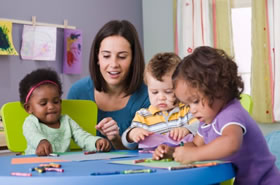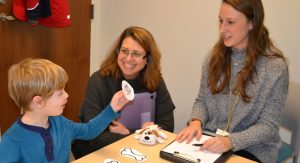
A language delay occurs when a child’s language skills are acquired in a typical sequence, but lag behind peers their own age. A language disorder is characterized by atypical language acquisition significantly disrupting communication across settings. If a child’s development of speech and language appears slower than normal, an appointment with a pediatrician is recommended in order to to ask about the child’s communication development and to learn whether a referral to a speech language pathologist is appropriate. For children with possible concerns with language the following questions are important to consider:
Does the child understand language? The ability to understand language, also referred to as receptive language, usually precedes expression and use. Skills can include following simple directions, responding to their name when called, pointing to pictures when named, and identifying body parts and clothing items.
How does the child use gestures? All children initially use gestures but generally outgrow them as they develop language. Children may use gestures instead of words to communicate their intents. Take note of the different gestures a child uses and how they are used in functional and social situations. Gestures may include pointing to request, pointing to “show” others, waving hello and goodbye or giving a “high five.”
How many new words is the child adding to his vocabulary each month? Even though he or she may appear to be slow in language development, new words should still be added frequently at least several words a week and even when not directly taught.
Can you understand what your child says? Even very young children should be able to convey a message, tell a story and describe events or pictures. Children should not experience extended communication frustration.

Does your child have difficulty in daycare/school? Some academic and/or behavioral issues may be related to language difficulties.
How does the child use non-verbal communication and socialize with others? Make note of social games that your child plays, as well as their interest in other children and adults. It is important make note of use of eye contact and overall social interest with other children and adults. Children with delayed or disordered language abilities have interest in play with other children, but may struggle to do so due to language deficits.
Remember, no two children are alike. Concerned parents should seek the counsel of a certified speech-language pathologist who can conduct an evaluation to assess any delays in communication and make recommendations for intervention. Children under three years of age can receive an evaluation through the Early Intervention program through the state of Illinois. For children over three years of age, evaluations can be conducted through the public school and/or in our center.
The Northwestern University Center for Audiology, Speech, Language, and Learning provides comprehensive evaluation and therapy services on the Evanston campus. Diagnostic evaluations determine the course of treatment, including frequency and appropriateness of individual and/or group therapy.
The Northwestern University Center for Audiology, Speech, Language, and Learning is a unique community resource that merges university research and innovative teaching with clinical services. Experts in the field – faculty who are nationally certified and state licensed speech-language pathologists – direct provision of clinical services, bringing exceptional knowledge and experience to our clients.
For more information, contact us at 847-491-3165 or nucasll@northwestern.edu.
